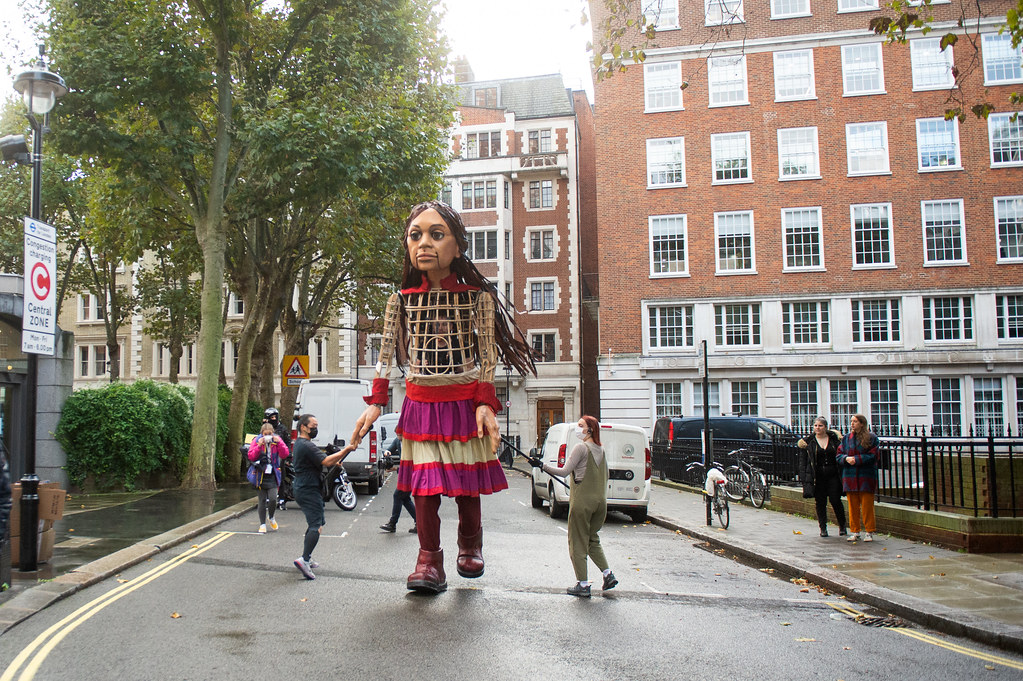
Last week, the New York Times published a summary of “The Walk”, the journey of Little Amal, a nine-year-old Syrian refugee who sets out in search of her mother. Amal, whose name means hope, is a 12-foot-tall puppet who has traveled over 5,000 miles in the last four months.
The Times piece details Little Amal’s travels through Turkey, Greece, the Vatican, France, and England. The authors describe some of the challenges the puppeteers faced and the reactions, both positive and negative, that they experienced along the way.
Not surprisingly, but unfortunately, not everyone welcomed Little Amal. One of the producers, David Lan, is quoted as saying, “If we are not wanted, we don’t go”. His goal: to create a corridor of friends around the world. Friends: individuals who could relate to the character of a little girl looking for her mother.
Little Amal’s story highlights the challenges Syrian refugees have faced. There are over 20 million people in need as a result of civil war that began in March 2011. For over a decade, Syrians have been experiencing a humanitarian emergency: they are vulnerable and have limited capacity to survive a constant barrage of life-threatening events. In Syria, access to basic services such as food, water, electricity, healthcare, and schools are either unavailable or severely limited. Communities have been destroyed and families have been separated. More than 80% of Syrians live in extreme poverty. Many rely on financial support from family members living in other countries.
Coverage of the conflict in Syria does not dominate the US news cycle, but there is some information available to Americans who care to be informed. CBS, CNN, and the New York Times all have pages that provide news and updates on the Syrian conflict. Although some research has been done on the conflict, much more is needed. Some experts are calling for an accelerated peace process, recognizing the devastating effects the long war has had on Syrians’ overall wellbeing.
Despite evidence of this humanitarian crisis, widespread resistance to accepting Syrian refugees persists. Sadly, the idea that accepting refugees is a humanitarian imperative seems to have fallen out of favor. As a result, millions of Syrians are living in refugee camps and confronting conditions that continue to threaten their daily existence: unprotected exposure to the elements (excessive heat and harsh winters), food insecurity, and threats of various forms of violence. Not only is the experience of living in a refugee camp traumatic, it is also associated with multiple mental health issues.
Some say that all human beings are part of a “global community responsible for producing refugees”. But based on the comments to the story on Little Amal, there seems to be a lack of consensus. Some readers argued that borders should be closed while others argued that there should be greater compassion for refugees’ suffering.
Unfortunately, we live in a society where it is very easy for some to simply look the other way. It’s acceptable to say, “Little Amal’s problems are not my problems”. We are permitted to describe horrific events that affect the lives of millions as a “country-specific” humanitarian crisis rather than a global humanitarian crisis.
A quick Google search of top issues affecting Americans in 2021 turns up a report produced by one of the Big Five Consulting Companies. Their list of top issues includes: climate action, criminal justice reform, national defense, economic recovery, education, the future of work, government reform, health care, innovation, racial equity, regulation, social impact, taxes, transportation, and workforce development. This list references a topic important to almost every special interest group and subgroup in American society. And none of them are new issues. These are the same issues America has been “working to address” for years.
Looking critically at the issues on the list, we can see that, in 2021, America is concerned with, basically, everything. Everything, that is, but the humanitarian crisis refugees face. Why isn’t one of the most important issues facing America in 2021 saving or improving human lives?
Further, only one of the issues listed requires America to look beyond its own borders: climate change. World leaders emerged from the November 2021 G20 summit in Rome with more promises of collaborative action to reduce global warming and activist quickly countered that mere promises are not enough.
In fairness, making progress on issues like criminal justice reform, social impact and racial equity could also be tied to saving and improving lives. But America’s focus is centered narrowly within its own borders.
Interestingly, the report did not cite specific targets for each issue area. If targets are created, I suggest they include a metric related to the number of lives saved or improved. Maybe this would lead Americans to be more empathetic to Little Amal and the experience of millions of displaced Syrians.
Domestic policies that reflect a sensitivity to universal humanitarian principles could have positive effects at home and abroad. The idea of calling for humane policies that promote both U.S. interests with the principles of humanitarianism is not new. The fact that there is a lack of consensus in interpreting all aspects of humanitarian laws and policies could be one reason why they are so hard to develop and implement.
Domestic policies, by themselves, however, are not enough. There needs to be an individual awareness and commitment to advancing humanitarian principles. Experts have argued that individual actions are insufficient with respect to global humanitarianism: it takes countries and coalitions. That’s probably true but I can’t see the harm in advocating for every individual to assume a sense of personal responsibility for addressing issues that threaten humanity.
The organizers of The Walk used art to create connections among individuals from different countries and bring people from different cultures together. Their success in building a corridor of friends, and raising awareness, for Little Amal was possible because individuals, not governments, were able to sympathize and empathize with the experience of a lost little girl. Little Amal reminds us of our shared humanity.
Watching Little Amal’s journey gives us an opportunity to connect with her human experience – her feelings, hopes and thoughts. As we observe her encounters with people in different communities, we become sensitive to her feelings of pain, loss, hope, love, belonging, and fear. We see her determination, courage, kindness, innocence, and confusion. We root her on because we want this child to succeed on her journey – just like we want our own children to succeed on theirs.
Little Amal’s journey also provides us with an opportunity to ask ourselves – what would we do if we were in her shoes? How would we feel? What supports would we need? How would we carry on? It provides us with an opportunity to realize that, since we are not living in the same circumstances that Little Amal is – we are able to help her.
By becoming informed about and standing up for Little Amal, and all those like her, we embrace our personal responsibility as human beings to act in ways that build a better society.
